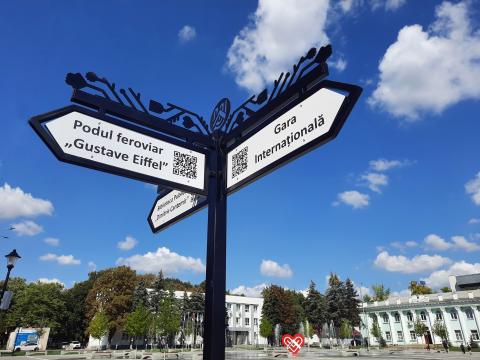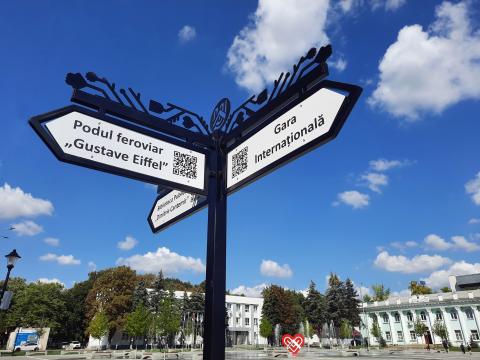
Touristic Information Signs with QR codes installed in Ungheni city

About this good practice
The limited access to up-to-date, multilingual, and interactive information for tourists resulted to be a problem for visitors of the region. The rise of smartphone use and demand for digital content, combined with the need for sustainability and contactless solutions, stimulate the introduction of QR touristic signs, offering a eco-friendly solution for enhancing visitor experiences.
The installation of tourist signs with QR codes allows visitors to Ungheni to explore tourist destinations. These signs are strategically placed in easily accessible places for tourists so that they can scan the QR codes without difficulty. By scanning these signs, the city can offer visitors a modern, digital experience while contributing to more sustainable and accessible tourism.
The Tourist Information Center and Ungheni City Hall are the main stakeholders, as they facilitate more efficient information management, reduce costs, support sustainability and offer tourists a modernized, flexible and accessible experience in Ungheni City.
Beneficiaries are tourists, gaining access to multilingual information, enhancing their experience, and local businesses that attract more visitors. Tourism related entities also benefit by improving visitor engagement and satisfaction, promoting the region’s attractions more effectively.
Resources needed
The execution and installation of 50 tourist signs with QR codes cost 8,800 euros, which were produced within the project "Sustainable actions for economic growth through tourism" financed by Mayors' Facility for Economic Growth and French Embassy and the twin city Andrezieux-Boutheon in France.
Evidence of success
AAccording to statistics, tourist indicators with QR codes determined a increase in interest of locals and tourists to explore the material heritage of Ungheni city. 60 representatives of twin cities and development partners of Ungheni, who come from 10 countries (Poland, Romania, Turkey, Georgia, Japan, Ukraine, Lithuania, Estonia, Israel, Germany) participating at the city’s days mentioned that it is much easier to reach tourist attractions by scanning the QR codes installed on city’s streets.
Potential for learning or transfer
Installing QR code tourist signs is simple to implement and easy to adapt to various tourist locations, from large cities to smaller communities. QR codes provide information about a variety of points of interest: historical monuments, public squares, cultural trails, natural attractions.
An important feature of QR codes is the ability to provide information in multiple languages, thus attracting international tourists and provide them with an experience without language barriers.
The widespread use of smartphones ensures that most tourists can engage with QR codes without needing additional tools, meeting expectations of modern travellers who are reliant on mobile technology for navigation and information.
Installing QR code signs significantly reduce the costs associated with physical materials, being environmentally friendly.
A key limitation is the availability of stable internet access. The content linked to QR codes must be kept up-to-date, relevant, and attractive.
Further information
Images


Website
Good practice owner
You can contact the good practice owner below for more detailed information.